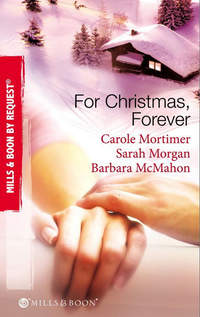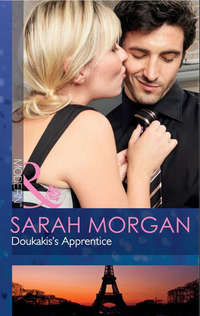
Полная версия
One Summer In Paris
She hadn’t misheard him.
“Is this because I bought Stephen a gift?”
“No.” He muttered something and tugged at his collar again. “I shouldn’t be doing this now. I didn’t plan to. I should have—”
“Is it because of Sophie leaving? I know it’s unsettling…”
Panic gripped her heart. Squeezed. Squeezed some more. Her lungs. She couldn’t breathe. She was going to pass out in her duck confit. She imagined the story appearing in the following day’s edition of the Woodbrook Post.
A local woman was asphyxiated when she fell face-first into her meal.
“It’s not because of Sophie. It’s us. Things haven’t been right for a while.”
There was something in David’s eyes she’d never seen before.
Pity. Yes, there was sadness, and also guilt, but it was the pity that tore her to shreds.
This was David. Her David—who had cried on their wedding day because he loved her so much, who had held her while their daughter fought her way into the world and been there for Grace through thick and thin. David, her best friend and the only person who truly knew her.
He would never want to see her hurt, let alone hurt her himself. Knowing that, she felt her panic turn to fear. He didn’t want to hurt her but he was doing it anyway—which meant this was serious. He’d decided he’d rather hurt her than stay with her.
“I don’t understand.” Surely if something hadn’t been right, she’d have known? She and David had been a team for as long as she could remember. Without him she would have fallen apart all those years ago. “What hasn’t been right, David?”
“Our lives have become… I don’t know. Boring.” His forehead glistened with sweat. “Predictable. I go to work in the same place, see the same people and I come home every day to—”
“To me.” It was all too easy to finish his sentence. “So what you’re really saying is that I’m predictable. I’m boring.” Her hands were shaking and she clasped them in her lap.
“It’s not you, Grace. It’s me.”
The fact that he was shouldering the blame didn’t help. “How can it be all you? I’m the one you’re married to and you’re unhappy—which means I’m doing something wrong.” And the problem was that she loved the fact that their life was predictable. “I grew up with unpredictability, David. Believe me, it’s overrated.”
“I know what you grew up with.”
Of course he did.
Was she boring? God, was it true?
It was true that she was a little obsessed about them being good parents to Sophie, but that was important to David, too.
He undid another button on his shirt and gestured to the waiter to bring more water. “Why is it so hot in here? I don’t feel too good… I can’t remember what I was saying…”
She didn’t feel too good, either. “You were telling me you want a divorce.”
She hadn’t believed that word would ever come up in a conversation between her and David, and she wished it hadn’t come up now, in a public place. At least two of the people in the bistro had children in her class—which was unfortunate, given the nature of this conversation.
Mommy says you’re getting divorced, Mrs. Porter, is that right?
“Grace—”
David took a sip of water, and she noticed there was a tremor in his hand. He was looking pale and ill.
She was pretty sure that if she looked in the mirror she’d think the same about herself.
What about Sophie? She’d be devastated. What if she was too upset to go away for the summer? It was terrible, awful timing.
Monica would probably blame red meat. Too much testosterone.
“We can talk to someone, if you think that would help. Whatever it is that needs working on, we’ll work on it.”
“Fixing our marriage isn’t something you can add to your ‘To Do’ list, Grace.”
She felt color flood into her cheeks, because mentally she’d been doing exactly that. “We’ve been married for twenty-five years. There is nothing—nothing—we can’t fix.”
“I’m having an affair.”
The words were like a solid punch to her gut.
“No!” Her voice cracked. And that was how she felt. Cracked. Broken. As if she were a piece of fine china he’d flung against the cabinet. “Tell me that isn’t true.”
She was going to be sick. Right here in a pretty little French bistro, in front of an audience of around fifty people, she was going to be sick.
She could imagine how the kids in her class would react to that.
Did you barf, miss?
Yes, Connor. I barfed, but it had nothing to do with the duck.
David looked worse than she felt. “I didn’t plan it, Grace.”
“Is that supposed to make me feel better?”
She had a thousand questions.
Who is this woman? Do I know her? How long has it been going on?
In the end she asked only one. “Do you love her?”
David rubbed his fingers over his forehead. “I—Yes. I think so, yes.”
She almost doubled over. Not just sex, then, but feelings. Strong feelings.
It was the ultimate betrayal.
She stood, although her legs didn’t seem to agree with the decision. They felt like water. But she didn’t want the local community to witness any more of this conversation—not for his sake but for hers and Sophie’s. How much had people heard already? Was she going to be stopped in the supermarket?
I hear David doesn’t love you? That must be tough.
“Let’s go.”
“Grace, wait!” David fumbled for some bills and dropped them on the table without counting them.
Grace was already halfway to the door, the box filled with her Paris plans tucked under her arm. She had no idea why it seemed so important to take it with her. Maybe she didn’t want to leave her dreams lying around. The happy summer she’d spent months planning wasn’t going to happen. Instead, they’d spend the time dividing up property and belongings and consulting lawyers.
The reality of it swamped her.
David was the love of her life. He was the solid foundation upon which she’d constructed her wonderfully safe, predictable world. Without him the whole thing would crumble.
She felt as if she was having an out-of-body experience. Her mind was elsewhere but her body was still here in this bistro, going through the motions. Smiling, leaving—thank you, yes, the meal was delicious—as if her life hadn’t just been torn apart.
David pressed his hand to his chest again and shook his head when the waiter offered him his coat. “Grace, I’m not feeling too good—”
Seriously?
“Oddly enough, I’m not feeling too good, either.”
Did he expect sympathy?
“I feel as if—I can’t—”
David staggered and then collapsed, sending a trolley and a coat stand flying. The weight of him hit the floor with a sickening thud.
Grace couldn’t move.
Was this what shock did to you? Did it freeze you into a useless object?
Silence had fallen across the restaurant. She was vaguely aware that a few diners were standing up, the better to see what was going on. Waiters had turned to look at her, panic and expectation in their eyes.
David was on the floor, sweat covering his brow and his eyes bulging.
He clawed at the collar of his shirt and pressed his hand to his chest.
His eyes met hers and she saw the terror there.
Help me…help me.
“Call the emergency services.” She was fascinated by how normal she sounded.
She was trained in first aid, but her body and mind were paralyzed by the knowledge that her husband of twenty-five years didn’t love her anymore.
He’d been unfaithful to her. He’d had sex with another woman. Probably multiple times. How long had it been going on? Where? In their bed or somewhere else?
David’s throat made a rattling sound and Grace examined her response with a mixture of awe and curiosity. Was she seriously considering not resuscitating him?
My name is Grace Porter and I murdered my husband.
No, not murder. Murder was premeditated. This was more…opportunistic.
If he died she wouldn’t even know who to call to break the news. She’d have to look around her at the funeral and try to identify the one woman who was crying as hard as she was.
Dimly registering the clattering and panic around her, Grace stared down at him for what felt like minutes but was in fact no more than a few seconds.
This was the man she loved. They’d had a child together. She’d assumed they’d grow old together.
If he was bored with his life, why hadn’t he said something?
The injustice of it almost strangled her sense of duty. He hadn’t even given her a chance to fix things. He’d made the decision for both of them. How could he do that?
As sirens sounded in the distance, David made a choking sound and then his eyes closed.
Grace woke from her inertia.
She couldn’t let another person die even though it felt as if that person had stabbed her through the heart.
She knelt down beside him, felt for a pulse, checked his breathing and then put her hands on his chest and started compressions.
One, two, three—Damn you, David…damn you, David…
She counted as she pumped and then pinched his nose and breathed air into his mouth, trying not to think about those lips kissing another woman.
The first thing she was going to do when she got back home was change the sheets.
The sound of sirens grew louder. She willed them to hurry. She didn’t want him to die. That would be the easy way out for him, and Grace didn’t want to give him the easy way out.
She wanted answers.
Audrey
Thousands of miles away in London, Audrey was in the middle of studying for a chemistry exam when her bedroom door burst open.
“Which dress? Green or pink?” There was a note of wild panic in her mother’s voice. “The green shows more of my cleavage.”
Audrey didn’t turn her head from the screen. Why didn’t her mother ever knock? “I’m working.” And every word was a struggle. Whoever had put her brain together had done a crap job.
There were days when she totally hated her life and this was one of them.
“It’s Valentine’s Day. You should be out on a date. At your age I was already a party animal.”
Audrey knew just how much of a party animal her mother was. “My exams start in May.”
“You mean July.”
“I’m done by the middle of June.” Why did it bother her that her mother didn’t know that? She should be used to it by now. “These exams are a big deal.”
Audrey felt sick about them. She was terrible at exams. It didn’t help that the teachers kept saying that the results would affect their whole future. If that was really the case then her life was already over.
Everyone else in her class had parents nagging them.
Are you doing enough work?
Should you be going out on a school night?
No, you don’t need fizzy drinks and pizza.
Audrey longed for someone to show her that much care and attention. Any care and attention. She longed for her mother to stroke her hair, bring her a cup of tea and say a few encouraging words, but her mother did none of those things and she’d given up hoping for it.
She’d been six years old when she’d realized her mother was different from other mothers.
While her friends’ parents hovered outside the school gate, Audrey stood alone, waiting for a mother who frequently didn’t show up.
She hated being different, so she began making her own way home. The school had strict rules about only releasing a child into the care of a known adult, but Audrey found a way around that. If she smiled and waved a hand in the vague direction of a group of mothers, they’d assume hers was among them. She’d slip through the crowd and once she was out of sight she’d make her way home. It wasn’t far and she’d memorized the route. Turn at the red post box. Turn again at the big tree.
Day after day Audrey let herself into the empty house, unzipped her schoolbag and struggled with her homework. Every time she pulled her book out of her bag, she had a sick feeling in her stomach. Her handwriting looked as if a demented spider had hurled itself across the paper and she could never quite organize her thoughts in a way that made sense written down. Teachers despaired. She’d despaired. She tried hard, achieved nothing, stopped trying. What was the point?
When she’d tried telling her mother she found reading difficult, the suggestion had been that she watch TV instead.
Finally, after years of handing in messy work and missing deadlines, a teacher who was new to the school had insisted Audrey was tested.
Those tests showed her to be severely dyslexic. In a way the diagnosis was a relief. It meant she wasn’t stupid. On the other hand, she still felt stupid and now she also had a label.
They gave her extra time in exams, but everything was still a struggle. She needed help, but when her mother came home from work she usually fell asleep on the sofa.
For years Audrey had believed her mother was just more tired than other mothers. As she’d grown older and more observant she’d noticed that other people’s parents didn’t drink a bottle of wine or two every evening. Sometimes her mother was late arriving home, and then Audrey would know she’d started her drinking early. She had no idea how her mother managed to hold down her job as an office manager, but was thankful that she did.
Functional alcoholic. She’d done an internet search once and found the perfect description of her mother.
Audrey told no one. It was too embarrassing.
The happiest days were when a school friend invited Audrey for tea or a sleepover. Audrey would watch other mothers, and occasionally fathers, fussing over home-cooked meals and homework and wonder why her mother didn’t know that was the way it was supposed to be done. She tried not to think about their empty fridge, or the empty bottles stacked outside the back door. More embarrassing were the men her mother brought home from her after-work drinking sessions. Fortunately, since meeting Ron, that had stopped. Audrey was pinning all her hopes on Ron.
“Your exams are done by June?” Her mother leaned on the edge of the desk, creasing a stack of papers. “I had no idea. You should have told me.”
You should have known. Audrey tugged at the papers and moved them out of harm’s way. “I didn’t think you’d be interested.”
“What’s that supposed to mean? Of course I’m interested. I’m your mother.”
Audrey was careful not to react. “Right. Well—”
“You know I’ve been busy planning the wedding. If you’re done by the middle of June, then that means you’ll be around all summer.”
Not if she had anything to do with it. “I won’t be here in the summer. I’m going traveling.”
It had been a spur of the moment decision, driven by a deep-seated horror of being at home.
She’d saved some money from her Saturday job at the hair salon and hidden it inside the soft toy she’d had since childhood. She didn’t trust her mother not to use the money to buy drink, and that money was her hope for the future. Every time she felt herself sinking into darkness, she looked at the bear that she placed in the middle of her bed every day. He had a missing eye and discolored fur, but he felt like a friend to her. A coconspirator in her escape plan. She’d worked out that it should be enough to get her a ticket somewhere. Once she was there she’d find a job. Anything was better than being trapped here in the repetitive, exhausting cycle that was living with her mother.
“That’s good. It’s just that with Ron and I newly married, well—you know—” She nudged Audrey, woman to woman.
Audrey did know. The walls in their house were thin. She probably knew far too much for a person her age.
She noticed that her mother didn’t ask where she was traveling, or with whom. All she cared about was that Audrey wouldn’t be around to intrude on her romantic interlude.
It hurt even though it shouldn’t, but Audrey was used to handling conflicting emotions. And to be honest she was relieved that her mother and Ron were getting married. Ron treated her mother well, and if the wedding went ahead, then Audrey would no longer feel responsible for her.
A whole new life was within reach.
“I’m spending the summer in Paris.” The idea had come to her in a flash the week before. Paris was meant to be beautiful in the summer. The men were hot, the accent was sexy and if they talked crap, as most boys did in her experience, it wouldn’t matter because she wouldn’t understand them anyway. Best of all, she could get away from home.
The first thing she was going to do when she had her own place was put a lock on the door.
Her mother sank onto Audrey’s bed, ignoring the piles of clothes that needed sorting. “Do you speak French?”
“No, which is why I want to live in France.” In fact, it wasn’t, but it was as plausible a reason as any and her mother wasn’t a woman given to examining anything in greater depth. “I need a language.”
“It will be good for you. You need to live a little! At your age—”
“Yeah, I know, you were having the time of your life.”
“No need to use that tone. You’re only young once, Audie.”
Most days she felt about a hundred. “I need to work now. I have a test tomorrow.”
Her mother stood up and wrapped her arms around Audrey. “I love you. I’m proud of you. I probably don’t tell you that enough.”
Audrey sat so stiffly she wondered if a spine could snap. The fumes from her mother’s perfume almost choked her.
Part of her wanted to sink into her mother’s arms and let her take the worry for once, but she knew better than to lower her guard. Within minutes her mother could be screaming at her, throwing things and saying mean words.
Audrey had never understood why mean words sounded louder than kind ones.
“You’re very tense.” Her mother released her. “Would a drink help relax you?”
“No thanks.” She knew her mother wouldn’t be offering a cup of tea.
“I opened a bottle of wine. I could spare you a glass.”
Wine explained the glittering eyes and the brittle mood. It also explained the perfume. “Have you eaten?”
“What? No.” Linda smoothed the dress over her hips. “I don’t want to get fat. What are you studying?”
Audrey blinked.
Her mother had never shown the slightest interest in what Audrey did with her life. At the open evening at school when they’d been invited in to discuss subject choices and university, Audrey had been the only student attending alone. As usual, she’d lied and said her mother was working. It sounded so much better than admitting that her mother couldn’t be bothered and that the only time her father had been present in her life had been during her conception. She lied so much about her life that sometimes she forgot the truth herself.
She cleared her throat. “Organic chemistry.” And she was going to fail. She’d picked sciences so that she could avoid essays and reading, but there was still a ton of reading and writing. After this she was never studying anything ever again.
“I think this fad for everything organic is nonsense.” Her mother checked her reflection in the mirror on Audrey’s desk. “It’s just an excuse for the supermarkets to charge more.”
Audrey sat with slumped shoulders, swamped in misery as she stared at her laptop screen. Go away. Just go away! She sometimes found it hard to believe she and her mother were related. Most days she felt as if she’d been dropped by a stork into the wrong house.
“Mum—”
“You’ve always been a slow learner, Audrey. You just have to accept that. But look on the bright side—you’re pretty, and you have big—” her mother thrust her hands under her breasts to make her point “—get yourself a male boss and they’ll never notice that you can’t spell.”
Audrey imagined the interview.
What do you consider to be your best qualities?
They’re both attached to the front of my chest.
Not in her lifetime.
If a work colleague ever touched her boobs Audrey would break his arm.
“Mum—”
“I’m not saying that college isn’t fun, but everyone gets a degree these days. It’s nothing special. You pay a fortune for something that in the end means nothing. Life experience, that’s what matters.”
Audrey took a breath. “Wear the green dress.”
She was exhausted. She wasn’t sleeping. Her schoolwork was suffering.
Her friend Meena had helped her make a spreadsheet with all her exams on it. Then they’d set alerts on Audrey’s phone, because she was terrified of misreading the spreadsheet and getting her timing wrong. They’d printed out an enlarged version and stuck it on her wall because every since the day her mother had drunk a bottle of whiskey and decided it would be a good idea to throw the computer in the trash, Audrey no longer dared risk storing things on her laptop.
You teenagers spend too long on screens.
On the calendar above her desk were crosses where Audrey marked the end of each day. Each cross took her closer to the day when she could leave school and home.
Her mother was still hovering. “You don’t think Ron would prefer the pink? It shows a little hint of lingerie, and that’s always good.”
“It isn’t good! It looks like you forgot to get dressed! It’s called underwear for a reason. It’s supposed to be worn under clothes.” Bursting with exasperation, Audrey finally glanced away from the screen. Her mother’s hair was wild from pulling dresses on and off. “Wear the dress you prefer. You can’t live your life constantly trying to please another person.” She couldn’t for a moment imagine asking a man what she should wear. She wore what she liked. Her friends wore what they liked. It was a roundabout of trying to fit in and trying to be different.
Linda’s lip trembled. “I want him to think I’m pretty.”
Audrey wanted Ron to think her mother was pretty, too. Audrey wanted Ron to take care of her mother, so she didn’t have to.
“Green,” she said. “Definitely green.”
None of the men her mother had dated had stuck around as long as Ron.
Audrey liked Ron. His favorite response to everything was As long as no one is dead, it will be fine. Audrey wished she could believe it. “Stop drinking. Sober is sexy. Drunk isn’t.”
“What are you talking about? I’ve had a drink, yes, but I’m not drunk.”
Audrey paused, her heart pounding. “You drink a lot, Mum. Too much.” And her biggest dread was that Ron would grow tired of it. “Maybe you should talk to the doctor, or—”
“Why would I talk to a doctor?”
“Because you have a problem.”
“You’re the one with the problem, but I can’t reason with you when you’re in this mood.” Her mother flounced out of the room, slamming the door.
Audrey stared at the door, feeling sick. This was why she rarely brought the subject up. How could her mother think she didn’t have a problem? Someone in this house was crazy and Audrey was starting to think it must be her.
And now her mother was upset. What if she went off the deep end and she drank everything in the house? From time to time Audrey went through the place, room by room, hunting down hidden bottles. She hadn’t done it in a while.
Stressed, she grabbed a chocolate bar from the stash she kept hidden behind her textbooks.
She tried to get back to work but she couldn’t concentrate. Giving up, she left her room and stood listening.
She heard sounds of her mother crying noisily in the bathroom.
Crap. She knocked on the door. “Mum?”









